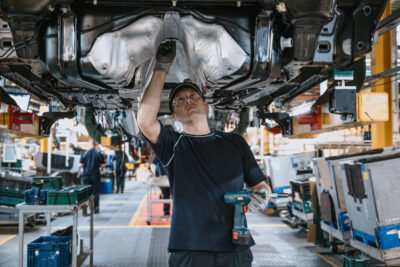The first half of the investment has already been made. According to JLR, it was used to modernise production lines and machinery, , and develop digital technology. A further £250 million will be invested in the coming years to produce plug-in hybrids and pure combustion engines in Halewood alongside electric cars for a transitional period before the site becomes a pure electric car factory.
As part of , the site in Halewood was expanded by over 32,000 square metres. The length of the final production line was increased from 4 to 6 kilometres to allow batteries to be installed in the vehicles. The historic factory has been equipped with modern technology, including 750 autonomous robots, ADAS calibration equipment, laser alignment technology “for perfect parts fitment,” as well as cloud-based digital management systems to monitor production, creating what JLR describes as a “factory of the future.
” This investment is part of JLR’s commitment to its Reimagine strategy, which will see JLR electrify all of its brands by 2030 and become carbon neutral across its supply chain, products, and operations by 2039—significantly later than the carmaker initially planned. In , JLR announced that it is moving away from its goal of launching six all-electric cars by 2026 and will instead focus on hybrids and plug-in hybrids, as the demand for battery-electric cars has slowed down. “Halewood has been the heart and soul of JLR in the Northwest of England for well over two deca.


















